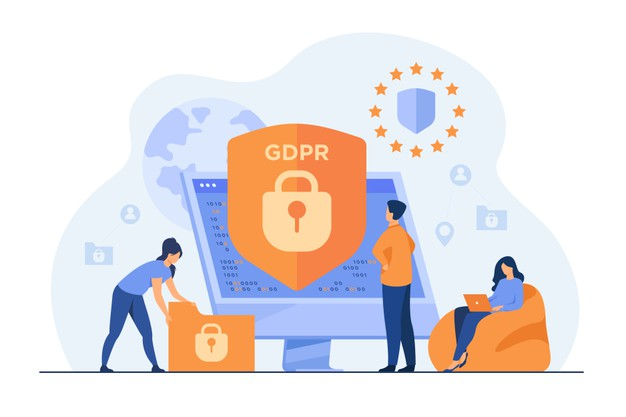
Every day we share our information with many kinds of businesses and organizations. As a business service provider, we also deal with personal data given by customers. The 8 Principles of Data Protection Act 1998 make sure our personal information is safe.
It is a vital step for businesses to secure their customer’s personal data by following the laws. If the customers find that laws are not followed, they have the right to complain. Security for personal data is the right of every person. It is also a mandatory duty for every business.
In the UK, the whole process of managing and securing personal information used to fall under the law. The law maintains the 8 principles of Data Protection Act 1998. However, due to technology growth, there are more threats to data protection. So in May 2018, there came an updated law in the European Union. It is known as the General Data Protection Regulation (GDPR). GDPR consists of six principles. The UK updated the data protection law following it. This law is known as Data Protection Act 2018.
Henceforth, the 8 principles of Data Protection Act 1998 are the same with minor changes. It was also updated with time. If you are a business owner or service provider, you must understand the Data Protection Act.
This article will help you have a better understanding of data protection laws in Europe. Furthermore, the article covers the eight principles of Data Protection Act 1998.
Table of Contents
What is Data Protection Act 1998?
Data Protection Act 1998 (DPA 1998) is the law imposed by the UK Parliament to protect people’s personal data. The law governs the process of data collection, storing, and disclosing by businesses.
Data is some of the information that businesses, organizations, or charities usually collect. In fact, these data are customer details, employee records, financial data, etc.
Organizations must collect personal data with privacy and consent. They have also to keep the data under protection. As a result, it will help prevent data leaks, identity theft, and misuse by frauds and third parties. The primary purpose of data protection is to stop anyone from identifying a person.

The organizations usually collect these common data:
The Information Commissioner’s Office (ICO) ensures businesses follow the Act. They investigate any kind of data breaches and take necessary steps against them. The Act gives people the right to access the information related to them and report any type of misuse.
Businesses have to abide by this law all the time through whatever process they get data. Whether they do so by computer or manual data systems, the data should be under security. The organization has to notify the ICO about the procedure of taking personal data.
If organizations fail to follow notifying, it will be a criminal offence. There is a particular way when and how you should notify the Commissioner. The Commissioner produces self-assessment guidelines to test when notification is necessary for business.
What are The 8 Key Principles of Data Protection Act 1998?
In order to run a business, we often keep our customer’s details. It is to keep records of everyone we are interacting with and generate leads. But data can be misused and may make a person victim of a crime. It will cause a loss in the organization and also its reputation.
Thus, data protection is essential for their own business and client safety. Moreover, abiding by the DPA will make your organization more trustworthy and reputable.

To make the data protection of your organization strong, follow all the 8 principles. These principles of data security are as follows
1. Processing Personal Information Fairly and Lawfully
The DPA 1998 first principle is about taking, holding, and disclosing personal data. It has to be a fair and lawful process. Businesses have to give specific information about them to the people who will give the data. Giving the details of your purpose gives them trust. The person can have an understanding of what personal information he or she will be sharing. So, maintain full transparency with the people you are taking data from. You can do so by giving them the following information:
You cannot force anyone who is not willing to give their personal information. An individual needs to provide wilful consent. Moreover, you have to clarify to the person that they can access and make corrections to the data if it is needed. If necessary, you should also inform them where else you will use the information in the future. The company cannot use the data in a way that will harm the owner of the data or other unexpected ways.
To simplify, a person has the right to give the data with their own will. An organization has to be fair and lawful about the process.
2. The Purpose Must be Specific and Valid for Obtaining Personal Information
You must have a valid, specific, and lawful purpose to collect and hold an individual’s data. Do not use the collected data beyond the stated reason. You must especially avoid incompatible, irrelevant, and mostly unlawful purposes.
Foremost, businesses should inform the reasons for taking the individual’s data. They should only use the data for that purpose. The organization should avoid using personal data to market another service. That too, especially without the data owner’s permission.
3. The Personal Information Obtained Should be Adequate, Relevant, and Not Excessive
The data you save about customers and employees should be enough for the reason you are taking it. It must not be too much or too little. The data has to be relatable and relevant and not unnecessary and have to suit your goal. Do not take more information than you need.
The best way to follow this principle is to understand what data you need to fulfill your goals. After knowing your goal requirements, you collect that much personal information.
4. The Personal Information has to be Accurate and Up to Date
The fourth principle requires the collected information to be correct. It also necessitates that organizations have to keep the data up to date. If the information is inaccurate, it needs updating with valid information.
Individuals have the right to update their information that organizations have on them. The organization must follow the updated information. Then the organization also has to stop the use of the previous data.
Furthermore, companies should always check the given data is correct and updated. They should not wait for the individual to come and correct or update the information. The organization should be active in ensuring that the data is correct. They also have to make it up to date by asking the individual when necessary.
5. Do not keep the Personal Information Longer than Necessary
The fifth principle is that you cannot keep personal data longer than it is necessary. It is important when the purpose of obtaining information is time-limited. Organizations must do regular checks on the time they hold the data of a person. It would be easier to handle the data entry and provide the exact info to people who need it. The organization must also delete or destroy data that are old or unnecessary.
6. People have the Right to Access Their Personal Information
The sixth principle of the DPA 1998 gives people the right to access their personal data. The organization has to the people their data when they ask for it. The person can object or ask you to stop using the data any longer if it is causing distress to them. If they do not want to be a part of direct marketing, they can object and claim their updated data. Individuals get to ask for compensation in case of data damage and breeches.
A person can request to see data that the organization holds by submitting an access request. They can request through letters, emails, or fax. Organizations can provide an online forum where the person can ask to stop using their data. But online form should not be the only way to do so.

7. Keep All the Personal Data Safely and Securely
According to the seventh principle, an organization must have a proper security system. The organization must safely keep the data. They must follow this rule through a physical or technical data security system. It is mandatory to train company staff on data protection and cybersecurity. Moreover, your data security system should follow the nature of your business. Places like banks and hospitals should have highly optimized data security.
Data breaches for inadequate or weak security systems are punishable with high cost. A sound security system ensures all the data is safe and no one can use it for mischievous purposes.
8. The Personal Information Should not be Transferred Outside the European Economic Area(EEA)
The last principle is for when you are going to transfer the personal data to another country. That country has to have the same level of data protection law. The data must not move out of the European Economic Area (EEA) if there is low data security in that place.
If organizations fail to follow the DPA principles, they could face severe penalties. There is a fine of up to £500,000 for not following this law. If you have any questions about data protection law, seek advice from the ICO or a legal professional.
DPA 2018 and GDPR
The General Data Protection Regulation (GDPR) came into effect on May 25, 2018. GDPR helps to stabilize the privacy policy. It also makes people aware of data protection across the European Union. The GDPR law encourages everyone to learn how to give personal data online and offline. The law also assists when to take necessary legal action if data privacy violation.

The Data Protection Act 2018 was made in compliance with GDPR and Old Data Protection Act 1998. The DPA 2018 gives people legal rights on their personal data that the organization took. A person has the right to:
Do you want to enhance your idea on data protection? You can join the GDPR Data Protection Training Course. This course teaches how to work with employees’ and clients’ data. It is also designed to inform general people about data protection and security.
Concluding Remarks
To conclude, every day, there are lots of crimes happening due to low data protection. Our duty as a service provider is to ensure data protection security. We also must seek our right to data protection as an individual
Read more blogs
- Seven Technologies for Small Businesses to Improve Workflow and Propel Customer Service
- 9 High-Demand Skills That Can Help Fast-Track Your Career in the Digital Economy
- 12 Beneficial Assignment Writing Tips for University Students
- What Can You Cook From Frozen?
- 7 Tips for Honing Your Photography Skills
- An Introverted Student’s Guide to Public Speaking
- The Importance of Learning English in Kindergarten: 10 Benefits for Young Learners
- What Are The 7 Steps Of Handwashing?
- The Ultimate Checklist for Your Overseas Education Adventure
- 5 Ways to Find Relevant Studies for your Research Paper




